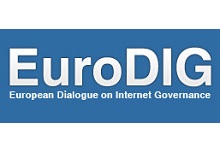Digital cooperation – Report from the UN High-level panel, part 1
19 Jun 2019 16:00h - 16:30h
Event report
[Read more session reports and live updates from the EuroDig 2019]
Mr Jovan Kurbalija (Executive Director, Secretariat of the High-level Panel on Digital Cooperation) presented the work of the UN Secretary-General’s High-level Panel on Digital Cooperation, as well as the main elements of the Panel’s Final Report. The session aimed to set the stage for discussion in the EuroDIG community on how the community can contribute to the follow-up consultations and implementation of the recommendations from the Panel’s work.
Kurbalija clarified that the UN Secretary-General (SG) set up the Panel guided by frequent calls to provide room for discussions on present and future digital developments. The Panel itself and the follow-up are guided by inclusiveness, multistakeholder approach, and an open dialogue on the issues we have been facing in the digital community worldwide. The Panel attempted to answer the question of how digital co-operation should be conducted. By digital co-operation, the Panel understood a way to work together to address the societal, ethical, legal, and economic impacts of digital technology in order to maximise benefits of society and minimise harms.
In order to fulfil its role as an advisor on the issue of digital co-operation, the Panel submitted its Final Report to the Secretary-General on 10 June 2019. The Panel held in situ and online consultations with a variety of communities – governments, Silicon Valley, developing countries, gamers, science fiction writers, etc. – with the aim of engaging various actors that are traditionally not represented in Internet governance processes. One of the legacies of the Panel’s work is the expectation that the post-Panel discussions will have the same level of interaction and involvement. Another achievement is that it introduced the inclusive and multistakeholder approach as a modus operandi when it comes to consultations and involvement in digital policy.
Kurbalija then presented the main elements of the report. It invites users to commit to the Declaration of Digital Interdependence outlined in the repor. Interdependence is a good basis for developing substantive engagement, but as it can be noted from the history of humanity, it can lead towards both conflict and co-operation.
Chapter 2 of the report underlines the need to leave no one behind. As the 2030 Agenda for Sustainable Development contains few references to digital technology, the Panel recommended that by 2030 all adults should have full access to digital networks, digital health, and digital finance. In addition, this chapter addresses digital public goods and data commons; digital equality for women and marginalised groups; measuring data on digital developments worldwide to facilitate discussions; and the establishment of digital policy help desks at the regional and global level.
The report also contains an invitation for the Secretary-General to review how human rights apply in the digital age. A recommendation regarding artificial intelligence (AI) relates to the need for accountability of humans for autonomous intelligence systems. Another recommendation refers to social media companies to work with governments, international and local civil society organisations and human rights experts around the world to fully understand and respond to concerns about the existing or potential human rights violations.
The Panel recommended the development of a Global Commitment on Digital Trust and Security. Any discussions on global commitment on trust and security online should be multistakeholder in its formal outcome.
The report addressed the mechanisms for global digital co-operation. The Panel first identified values and principles digital co-operation should support, which included the values enshrined in documents such as the UN Charter and the UN Declaration of Human Rights. Discussions on core values and principles in digital co-operation will continue and will be conducted in the preparation for the 75th anniversary of the UN. Next, the Panel identified gaps in the current digital co-operation frameworks, such as the lack of metrics and the lack of participation from small and developing countries, and proposed functions that should address those gaps, such as leadership, co-operation, capacity building, etc. The Panel then outlined three possible architectures that could perform ‘these functions, Internet Governance Forum ‘Plus’, Distributed Co-Governance Architecture, Digital Commons Architecture.
Responding to a question from the audience regarding the Internet Governance Forum (IGF) as a possible decision-making body, Kurbalija stated that while there is a need for agile, adaptive, and smart policymaking, it remains to be seen how this function will be accommodated – whether through the IGF Plus or another forum. He also underlined that there are numerous spaces where norms are adopted, and questioned whether they are enough and what kind of approach they should take. He also stressed that the multilateral and multistakeholder approaches are complementary and should not be put into a dichotomy.
Answering a question from the audience on the costs of implementing the recommendations made by the Panel, Kurbalija explained that the Panel did not cover funding mechanisms specifically in their recommendation, but that the issue was addressed in their discussions. He stated that there is a willingness among stakeholders to support the functions recommended. Kurbalija considers the help desk function the lowest hanging fruit to be addressed in the follow-up.
By Andrijana Gavrilović
Related topics
Related event

